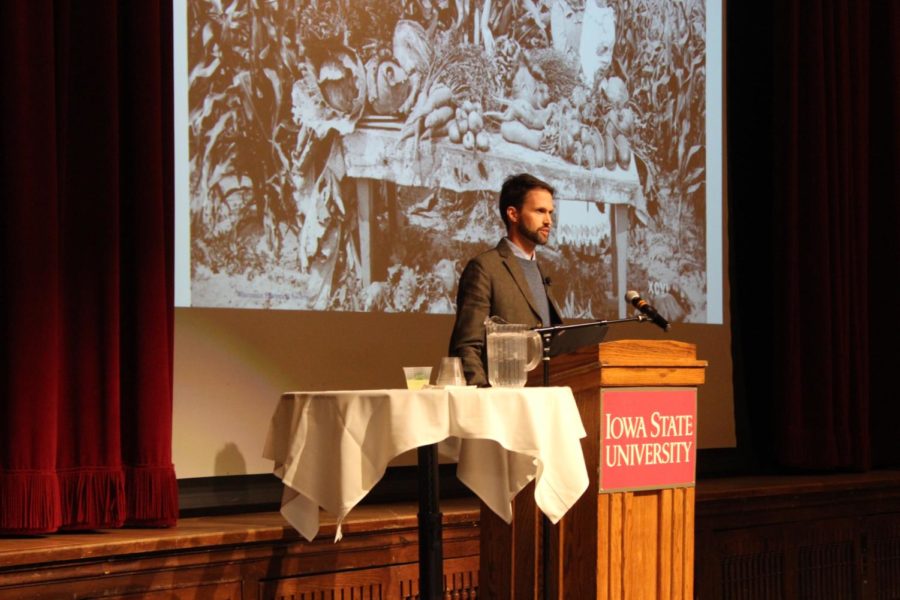Sustainability lecturer: ‘What we’re eating is moving toward a global standard’
Samantha Vaith/Iowa State Daily
Colin Khoury is a research scientist on what we grow, where we grow, and what we eat. He spoke in the Great Hall of the Memorial Union on Feb. 27 to a near-capacity audience.
February 27, 2017
The food people normally consume has connections to every country in the world.
Colin Khoury, research scientist at the International Center for Tropical Agriculture, gave his presentation dubbed “You are What You Eat, So Where Are You From” on Monday night to roughly 300 audience members as part of Iowa State University’s Symposium on Sustainability.
The lecture was sponsored by Green Umbrella, the Office of Sustainability and the Committee on Lectures.
At the beginning of his lecture, Khoury spoke about pizza. The audience knew that one of the main ingredients in the Italian dish is tomatoes. Khoury said tomatoes didn’t arrive in Europe until the Columbian Exchange in the 15th century, when people brought tomato seeds over from South America.
Eventually, the pizza Americans know today came over to North America and became part of the culture as a staple of identity in many American cities.
“We’re a country built on immigrants,” Khoury said. “But the food they brought with them were immigrants too.”
Since the Columbian Exchange, diets around the world have changed. For example, America has integrated food that originated from Western and Eastern Asia. Countries like China have given the United States soybeans, and countries from Central America gave the United States corn.
These two crops are staples in the identity of Iowa. Khoury said that even though many people know that Iowa is famous for its corn and soybeans, we must remember where they originated and that Iowa is connected to these countries.
“Every country is a donor,” Khoury said.
After you take into account the countries that give and receive crops from other countries, the world becomes interconnected, Khoury said.
Because of this interconnectedness, there is no truly native diet, because every country in the world is using crops given to them from other parts of the world.
“What we’re eating is moving toward a global standard,” Khoury said.
Khoury said that people are starting to eat less of the dominant native foods of their country and more of the foods given to them from other places.
Of course, each country that takes in these crops make it their own. Khoury called this “global with a local twist.”
This twist is what makes crops diverse, but we as humans need to make sure we can reproduce these crops for future research. This is where the sustainability of crops comes into play.
These crops that are modified to meet country’s needs are kept within gene banks all over the world. These gene banks, like the one in Fort Collins, Colorado, where Khoury works, keep samples of seeds from all over the United States.
But these gene banks are prone to disasters like floods, fires and other tragedies that could ruin the samples of seeds researchers have worked hard for.
Like saving a backup on your computer, researchers have deposited their seeds into a global gene bank called the Svalbard Global Seed Vault located on a Norwegian island.
Khoury said countries from all over the world have deposited their crop seeds into the vault in order to keep them safe for future research and potential disasters.
This global effort to preserve the interconnectedness that food has given us is important, especially to Jackson Griffith, an alumnus of Iowa State University. Griffith said that Khoury’s lecture is important because we are all in the fight together.
“When people come together, we can achieve better things,” Griffith said. “World hunger and poverty are global issues. To fix it is a global effort.”







